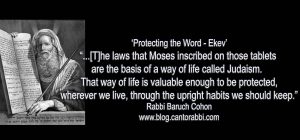PROTECTING THE WORD – Ekev – Deut. 7:12-11:25, by Rabbi Baruch Cohon
(Yes I said the Word, not the World.)
Along with its legal and historical sections, this week’s Torah reading includes Moses’ narrative of his second 40-day session on the mountain top, to receive the Divine Word. Chapter 10 opens with that narrative:
At that time, G-d told me: “Hew two stone tablets like the first ones, and climb up the mountain to Me. And you must make yourself a wooden ark.”
Last time there was no ark. Moses carried the tablets in his hands. Our commentators tell us what else was different then. The first tablets were Divinely created; they had no weight – until Moses saw the Golden Calf. In his shock and rage, the tablets became too heavy to hold. He had to throw them down and break them. This new set of tablets will be of earthstone, cut and carved by Moses himself, sizeable and weighty. He will need a container for them.
That container, the Holy Ark which he builds even before hewing the stone tablets, is not the only one to be used for this purpose. Rashi points out that this is not the Ark built by Bezalel the architect of the Tabernacle. That one will not come into use until after Yom Kippur, some time after the period of this story. We can assume, too, that Bezalel’s ark was a grand imposing structure. This ark is different. In fact, says Rashi, this is the ark that Israelite fighting forces would take with them to war. Practical and portable.
In this simple symbolic story, we learn a valuable fact: Both for formal ceremony and basic conduct, the Divine word must be protected. Daily life proves it. As we respect our various houses of worship, we implement that respect with thoughtful behavior. That’s why we stand up when the officiant approaches the Holy Ark and the scroll is taken out — just one familiar example of the ark’s function that Moses started.
In our work, our recreation, our family life, we can protect our Divine Word very readily. Conduct and conversation contribute to honoring that Word or dishonoring it. We are not carrying a wooden ark down the street but we can still guard the Word. Some of us choose to wear our heritage on our heads. All of us need to carry it inside our heads. After all, the laws that Moses inscribed on those tablets are the basis of a way of life called Judaism. That way of life is valuable enough to be protected, wherever we live, through the upright habits we should keep.
So how do we deal with those who acknowledge no Word as Divine, and who attack our way of life? Violent opposition, like terrorism, must of course be subject to violent combat. No matter what part of the world we are in, we can hope and plan and act, peacefully or violently, to achieve justice and attain true peace. And for the non-violent opponents, who disparage our Word and have nothing better to offer, good old stubbornness can still prevail.
My friend, here is where I stand. You may have different ideas, and we’ll have to discuss them reasonably, if at all. This Word, this way, is mine.
Protect the Word, as Moses did. With a little Divine help, it will inspire you.



